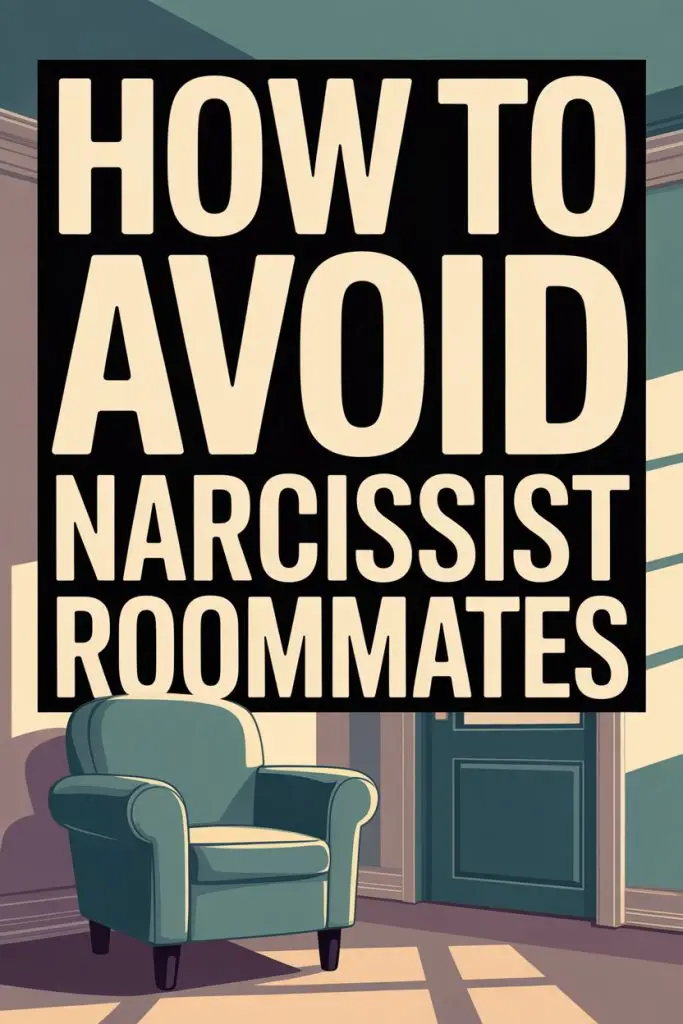Sharing your living space is one of life’s great trust falls.
Sometimes you land in a sea of home-cooked meals and compatible Netflix tastes. Other times, you’re left wondering if your new roommate’s mirror is their favorite companion.
Dodging the narcissist roommate trap isn’t impossible, but it does require a keen eye, some well-honed boundaries, and a willingness to trust your gut—yes, even if it’s still digesting last night’s questionable takeaway.
Here’s how to spot the warning signs before you sign the lease, and what to do if the only thing your potential roommate loves more than themselves is reminding you about it.
Reading the Signs Before Moving In
Nothing says “potential disaster” quite like discovering your new roommate treats your shared flat like their own personal Instagram backdrop.
Narcissists rarely introduce themselves as such (can you imagine?), but certain behaviors are dead giveaways during the pre-move-in dance.
During those initial chats, pay attention to conversational balance. Are you being talked at or talked with? If your interview feels like a monologue starring them, that’s your cue to smile, nod, and slowly back away.
A person obsessed with their own achievements, who skillfully steers every discussion back to themselves, deserves their own studio apartment—preferably without witnesses.
The Charm Offensive and Other Red Flags
Narcissists are pros at first impressions. You might think you’ve found the world’s most charismatic, successful, self-assured roommate. You haven’t. You’ve just met someone fluent in charm with a minor in manipulation.
Be wary of love-bombing. If your potential housemate is already gushing about the “amazing energy” between you two or suggesting you’ll be best mates for life, take a breath.
People with healthy self-esteem want to connect, but they don’t need to audition for your approval with grand gestures and flattery.
Interrogating Their Reference Game
References aren’t just a landlord’s ploy to be nosy. They’re your best chance to uncover whether your possible roomie has left a trail of broken toasters and broken spirits in their wake.
Ask for references from former housemates, not just employers. Then, actually contact them. Was living together “delightful” or “a learning experience”?
The devil’s in the details, and if the best they can muster is, “Well, they were…tidy,” it’s time to keep looking.
Trusting the Vibe Check
Call it intuition, gut feeling, or your internal “nope” alarm—it’s rarely wrong. If something about a person feels off during your first few interactions, take that seriously.
Narcissists have a knack for making you doubt yourself, so don’t hand them the remote control to your instincts.
If you leave an interview feeling drained or on edge, don’t dismiss it. A healthy roommate connection should feel like a comfortable pair of shoes, not a pair that pinches in all the wrong places.
Setting Boundaries Like a Pro
Let’s say you spot a few red flags, but you’re desperate (London rents, am I right?). If moving in is unavoidable, boundaries are your secret weapon.
Narcissists thrive on blurred lines—they’ll eat your leftovers, borrow your shampoo, and “forget” to pay the Wi-Fi bill.
Be explicit about house rules long before you move your toothbrush in. Write out expectations about chores, guests, noise, shared spaces, and bills. Get it in writing if possible.
If they scoff at the idea or treat your requests like an attack on their personal freedom, congratulations—you’ve just dodged a bullet.
Watching for the Victim Routine
Narcissists come with an impressive portfolio of grievances. Ex-roommates were “too sensitive.” Landlords just “didn’t appreciate their creativity.”
If your potential flatmate’s life is a never-ending saga of being misunderstood, you’re likely about to become the next villain in their story.
Empathy is important, but if every tale winds up with them as the long-suffering hero, it’s not a coincidence. It’s the preview of drama to come.
Social Media Sleuthing
Normally, snooping is a frowned-upon habit. But when it comes to self-preservation? Consider it due diligence. Scroll through their social feeds.
Is it a wall-to-wall selfie festival? Is every post a humblebrag thinly disguised as deep introspection? Are all their ex-friends tagged in passive-aggressive memes?
No need to play Sherlock Holmes, but a little digital recon can reveal if you’re dealing with someone who needs an audience more than a roommate.
The Money Conversation
Finances and narcissism make a volatile cocktail. Trouble paying bills is one thing. The roommate who “forgets” to pay rent because they invested in “something big” (another Bitcoin, perhaps?) is another.
Rule of thumb: if your future flatmate refuses to discuss money, makes vague promises, or has a complicated explanation for every bounced payment, expect their sense of entitlement to extend to your wallet.
The Test Drive: Temporary Trials
Short-term lets, sublets, or trial periods are your best friend. Whenever possible, suggest a month-to-month arrangement before committing to a year-long lease.
No narcissist can keep the mask on forever. Over a few weeks, you’ll see whether they chip in with cleaning, respect your space, and occasionally ask about your day.
Or, if every conversation becomes an impromptu TED Talk about their greatness.
The Exit Plan
Sometimes, despite your best efforts, you wind up living with a narcissist. Don’t panic—there’s no need to start drafting your own tragic novella.
Document everything. Keep records of shared expenses, texts, and agreements. If boundaries are broken, state your position clearly and calmly.
If the situation goes off the rails, consult your lease, know your rights, and plan your escape route. No roommate is worth sacrificing your peace (or your security deposit).
When All Else Fails—Raise Your Standards, Not Your Tolerance
Plenty of people are a little self-involved, especially during stressful flat hunts. The trouble starts when their needs always come first, and yours are left squinting in the shadows.
Looking for a home—not just a place to store your stuff—means refusing to settle for someone who treats you like an extra in their one-man show. There are good, considerate, non-narcissistic flatmates out there.
Sometimes, it just takes a little patience and a willingness to walk away from red flags instead of collecting them.
Your Home, Your Rules
A healthy flatshare can be a sanctuary, a source of laughter, and the launchpad for lifelong friendships. Watching for narcissistic signs isn’t about being cynical; it’s about preserving your peace (and your milk).
Keep your standards high, your boundaries firm, and your sense of humor intact.
Before you know it, you’ll find a roommate who knows how to share the remote—and the spotlight.


